From API’s Communications Team
 Research has, for many years, shown that the way a child is parented will physically shape his brain — that each interaction, good or bad, will create pathways within the brain as a reflection of the emotions surrounding that interaction. And that a pattern of neglect or abuse will shape the brain differently than will a consistently loving, attachment-promoting relationship.
Research has, for many years, shown that the way a child is parented will physically shape his brain — that each interaction, good or bad, will create pathways within the brain as a reflection of the emotions surrounding that interaction. And that a pattern of neglect or abuse will shape the brain differently than will a consistently loving, attachment-promoting relationship.
Now, a new study published in a February 2009 issue of Nature Neuroscience — as reported in the The New York Times article, “After Abuse, Changes in the Brain — shows that, in addition to shaping the brain, patterns of interaction change the way a person’s genes are expressed.
Researchers at McGill University in Montreal, Quebec, Canada, have found for at least ten years that affectionate mothering alters the expression of genes in animals. These changes in the genetic code are then passed on to the next generation. For the first time, there is direct evidence that the same happens in human DNA. McGill researchers report that people who were abused or neglected as children had genetic alterations that made them more biologically sensitive to stress.
McGill teamed up with the Singapore Institute for Clinical Sciences to compare the brains of 12 people who had difficult childhoods before committing suicide with the brains of 12 people who did not suffer abuse or neglect as children.
When humans are under stress, the hormone cortisol circulates and puts the body in a state of anxiety. One way the brain reduces this response is to make receptors on brain cells that help clear the cortisol, reducing the feeling of distress and protecting neurons from the damaging effects of extended exposure to cortisol.
Researchers found that the genes that code these receptors were 40 percent less active in people who had difficult childhoods than those who did not.
There is still speculation as to why some people with difficult childhoods are able to regulate stress more easily while others are not. Possibilities include individual genetic differences or an individual’s ability to connect with other people who help stabilize his stress response.
To read this entire article, go to: www.nytimes.com/2009/02/24/health/research/24abuse.html?emc=eta1.
One thought on “Parenting Style Changes Gene Expression”